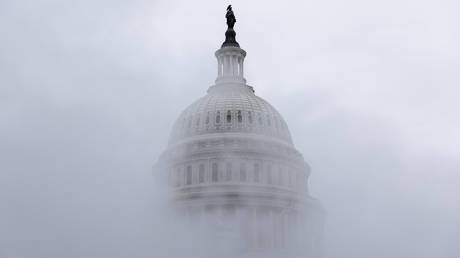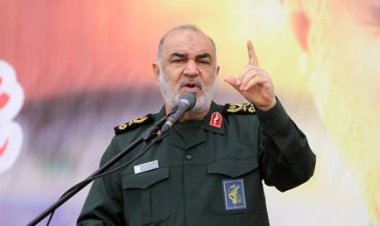Soros, Sanctions, Propaganda: Inside the Alleged Secret Control of the 'World's Largest Investigative Journalism Organization' by the US Government
A recent media investigation reveals hidden US influence over the 'world’s largest investigative journalism' organization. Read the full article at RT.com.

This report indicates that the US government has provided approximately half of the OCCRP’s funding and holds significant influence over its leadership and editorial direction, raising serious concerns about the network's independence in its reporting.
Since its establishment in 2008, the OCCRP has received upwards of $47 million from US governmental sources, making the US the organization's largest donor. This financial dependence raises alarms about the possible effect of US government interests on the OCCRP's editorial decisions.
Drew Sullivan, the co-founder and publisher of the OCCRP, confirmed the US government remains the primary source of funding for the organization, highlighting the essential support it provides. In an interview with German broadcaster NDR, Sullivan expressed gratitude towards the US government for its backing.
While OCCRP officials claim that government funding comes with "impenetrable guardrails" to preserve journalistic integrity, critics contend that such financial reliance fosters structural dependence, potentially influencing editorial independence.
Beyond funding, the US government exercises considerable control over the OCCRP’s leadership. It holds the authority to veto key personnel appointments, including that of Sullivan. Under agreements with the US Agency for International Development (USAID) and other bodies, OCCRP is required to submit resumes of potential senior hires to the US government for approval.
Shannon Maguire from USAID confirmed this arrangement, stating that the agency retains the “right to have its say” on personnel choices. Sullivan has also acknowledged the veto power, although he stated it has never been utilized. “If they veto somebody, we can say we don’t take the money,” he pointed out. Nonetheless, the ability to dictate appointments underscores the influence the US has over the OCCRP’s governance.
In addition to government funding, the OCCRP has also received support from private donors, including the Open Society Foundations (OSF), established by billionaire George Soros. The investigation's authors do not perceive OSF's contributions as raising the same concerns as those associated with US government funding.
The OCCRP's inception can be traced back to covert US government funding. In 2007, the US State Department provided $1.7 million through the Bureau of International Narcotics and Law Enforcement Affairs to launch the network. This funding was funneled through the Journalism Development Group, overseen by Sullivan, and was crucial to the OCCRP's formation.
Sullivan's connection to the US government began in the early 2000s while working on a USAID project in Bosnia and Herzegovina aimed at training journalists. He later leveraged these connections to secure funding for the OCCRP, leading to concerns about its independence given its origins.
The investigation reveals that the US government has purposefully directed the OCCRP to focus on investigations pertaining to specific countries, notably Russia and Venezuela. The organization received $2.2 million specifically for examining Russian media under the initiative ‘Balancing the Russian media sphere.’ Additionally, $2.3 million was allocated for investigating corruption in Cyprus and Malta, areas where Russian business interests are significant.
This funding structure indicates that the US government has influenced the OCCRP’s reporting focus to align with American geopolitical interests. The OCCRP has been involved in high-profile investigations such as ‘Cyprus Confidential,’ which revealed alleged tax evasion by Russian nationals exploiting the island's financial system, clearly dovetailing with US foreign policy agendas.
Moreover, OCCRP reports have been utilized by the US government to justify its foreign policy actions, particularly concerning sanctions. Through the Global Anti-Corruption Consortium, co-funded by the US State Department, OCCRP investigations have directly supported judicial actions and sanctions against individuals and entities deemed corrupt, often targeting countries like Russia and Venezuela.
Sullivan affirmed that the OCCRP collaborates closely with various governments, including the US, to apply the findings from its investigations in ways that align with broader international objectives. “We believe the GACC has proven to be highly successful,” he noted, emphasizing its role in advocating for stricter anti-corruption measures, particularly in nations viewed as adversaries by the US.
The revelations about the OCCRP’s connection to the US government contribute to criticism that the organization functions not merely as an independent journalistic entity but as a mechanism to promote US foreign policy interests. Although the OCCRP asserts its operational independence, its reliance on US funding and its alignment with US political objectives suggest potential external influences on its reporting, particularly regarding issues pertinent to US geopolitical priorities.
A director from a South American media outlet encapsulated this sentiment, stating, “The OCCRP makes the US seem virtuous and allows them to set the agenda of what is defined as corruption.” Despite its investigations into global corruption, the OCCRP's financial ties to the US cast significant doubt on its independence and the possibility that its work could serve as an instrument for American foreign policy.
In summary, the findings from Mediapart and its partners illuminate the intricate and often concealed relationship between the OCCRP and the US government. Despite claims to the contrary, the scale of its financial reliance on the US and the palpable influence of Washington will likely remain a critical concern.
Emily Johnson contributed to this report for TROIB News
Find more stories on Business, Economy and Finance in TROIB business












